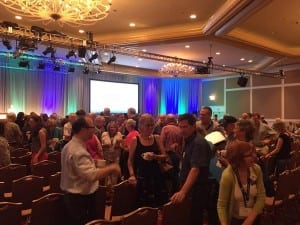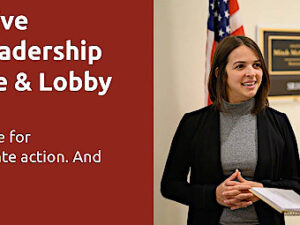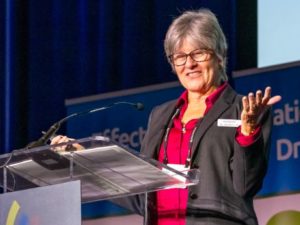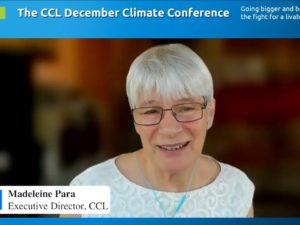By Joe Robertson
In 2009, three Citizens’ Climate Lobby core team members went to Capitol Hill, to start building a new way for citizens to engage Congress on climate and energy policy. In 2010, 25 volunteers came from around the U.S. Last year, CCL brought 608 citizen volunteers to Capitol Hill, for 507 meetings in 2 days. This morning, the 2015 CCL International Conference opens, with more than 900 citizen volunteers attending.
The first day starts with a meeting for CCL volunteer group leaders. The group leaders anchor hundreds of local chapters, where thousands of citizen volunteers are building local policy networks, adding their voices to the teams led by their legislators.
The work of Citizens’ Climate Lobby is not only about advocating for climate policy. One part of the mission is to build political will for a livable world. But equally vital to building this network of citizen-driven policy teams is the empowerment of individuals to play a role in the decision-making that governs what is possible in their society. CCL works to empower citizen volunteers to have breakthroughs in the exercise of their personal and political power.
Executive Director Mark Reynolds explained to CCL’s group leaders in this morning’s session that to be effective at making a better world possible, you have to adjust your thinking, enable yourself to find the subtlety and poetry in the work of empowering others.
Mark quoted William Stafford’s Writing the Australian Crawl:
“Poetry is the kind of thing you have to see from the corner of your eye. You can be too well prepared for poetry … It’s like a very faint star. If you look straight at it, you can’t see it, but if you look a little to one side it is there. If people around you are in favor, that helps poetry to be, to exist. It disappears under disfavor. There are things, you know, human things, that depend on commitment; poetry is one of those things. If you analyze it away, it’s gone.”
Stafford goes on to say that poetry is “a truth that has learned jujitsu” and that “anyone who is alive is caught up in the imminences, the doubts mixed with triumphant certainty, of poetry.”
This is actually what CCL is doing in the space of politics.
You cannot be effective in empowering others, or in working toward a goal, if you don’t believe it is possible. What has not yet been done is always just over the horizon, out of view, a subtlety at the edge of the field of vision, which we struggle to see with clarity. When that subtlety comes from outside our own conciousness, many people nudge it into the realm of personal belief. All too often, the feeling people zealously reinforce, about an emerging possibility, however they say it, is if it were possible, it would have been done by now.
That is deeply disempowering. It takes us all out of the picture. It breeds cynical interpretations of human potential, and cynicism is a forceful and insistent disempowering of oneself. Cynicism starts from the view that everything is in someone else’s hands, and it gathers momentum and begins to feel irrefutable, because from the cynic’s view, those people in whose hands all capability lies, cannot be trusted.
The cynic enjoys the satisfaction of placing blame, but does not enjoy the benefits of a solid ground for effective action. The biggest problem we face as human individuals, in the political world, is the feeling that we are alone, and that no help will come. Cynics are voicing a complaint that, at its core, is a complaint about feeling alone and without moral support.
CCL’s Program Director drew inspiration from Diana Nyad, who swam from Cuba to Key West successfully, at the age of 64. Upon succeeding, after many attempts, Nyad said of her effort: “It looks like a solitary sport, but it takes a team.” Madeleine “We’re doing our own long-distance swim as an organization.”
What CCL is doing is supposed to be impossible.
What makes it so unlikely is that we have countless ways, brought to us through virtually every culture, to arrive at the negative assumption that a team cannot be built that will carry the effort through. Mark asked the group leaders to think about the ways we carry judgment in our hearts, admit to it, focus on it, say it out loud, and then let it go.
When you let go of your need to pass judgment and place blame, you liberate yourself from the weight of false prophecy. We can choose between inaction and empowerment. So today, CCL opens its 6th annual conference, to empower a network of thousands of citizen volunteers, working in 260 active local chapters, with another 120 in development.
The aim is to ensure that empowered citizens play a direct role in making better policy, everywhere.
CCL’s Legislative Director, Danny Richter, PhD, who was one of the team of three that went to the Hill in 2009, said during this morning’s session: “It’s amazing to see so many old friends’ faces coming back refreshed, renewed and excited. It’s amazing to see how much we’ve grown, as an organzation and as individuals. I am excited to see what we can do.”
Joe Robertson is Global Strategy Director for Citizens’ Climate Lobby.






